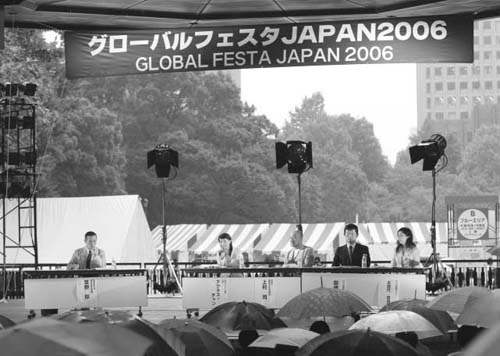Japan's Official Development Assistance White Paper 2006
Main Text > Part II ODA DISBURSEMENTS IN FISCAL YEAR 2005 > Chapter 2 Details about Japan's ODA > Section 5. Formulation and Implementation of ODA Policy > 2. Increasing Public Participation
2. Increasing Public Participation
(1) Broad Participation by Japanese Citizens from All Walks of Life
In view of the fact that taxpayers' money contributes to ODA, sustaining ODA requires efforts to gain public understanding and support from Japanese citizens toward ODA by promoting public relations and development education. At the same time, it is important to expand human resources engaging in ODA by further promoting public participatory cooperation activities, thereby encouraging the Japanese people to acquire a better understanding of ODA.
To expand the participation of the Japanese public on the basis of this concept, institutionalization has been promoted to allow involvement in the formulation and implementation of ODA at various levels. For example, opinions are solicited via the ODA website with regard to Country Assistance Programs. In so doing the Government is broadly embracing the views of the Japanese public at the level of development of ODA policy.
In addition to this, concerning participation of Japanese citizens from all walks of life in ODA, there are programs like the Japan Overseas Cooperation Volunteer (JOCV) and Senior Volunteer.
The JOCV project dispatches young people between the ages of 20 and 39 for a period of about two years to work for the people of developing countries, while also lending assistance to the social and economic development of the country. JOCV has a long history, having marked its 40th anniversary in 2005, and is one form of Japanese assistance that has been highly praised overseas. By FY2005, a total of 28,360 JOCV members had been dispatched overseas.
The corresponding project for seniors is a public participatory project under which JICA supports the activities of senior citizens between ages 40 to 69 who possess a wide range of skills and abundant experience and wish to contribute to the development of developing countries on a volunteer basis. Launched as "Senior Cooperation Experts" in FY1990, it was renamed "Senior Volunteer" in FY1996, being positioned as the volunteer project serving as the senior version of JOCV. By FY2005, a total of 2,697 senior volunteers had been dispatched to 56 countries.
In order to promote public participatory projects, provisions were established in the JICA Reform Plan (Phase 2) to diversify the forms of participation in JOCV and Senior Volunteer, such as a system for on-job participation by teachers and short-term dispatches of members (less than one year), with a view to further increasing public participation. In so doing JICA is setting in place an environment which is easier for the people to take part in the progress (see Part I, Chapter 2, Section 1 for details on JOCV).
Other programs for promoting citizens' participation include the annual International Cooperation Festival held in Tokyo's Hibiya Park in commemoration of International Cooperation Day, October 6 (the name of this festival changed to "Global Festa JAPAN" from FY2005), ODA Town Meetings, the ODA Lecture Series, and the Monitoring Group of Citizens on Japan's ODA launched in FY1999 (see Chapter 2, Section 5. 2. (4) for details on the status of ODA Town Meetings).

Global Festa Japan


 Next Page
Next Page